#Epoch's Maker
Text
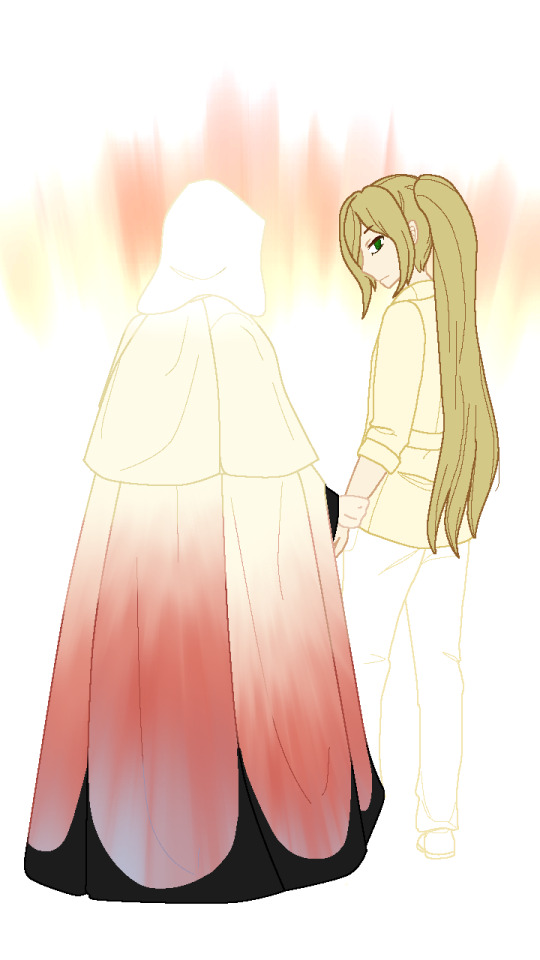
[ID from ALT: A digital fullbody art of my OCs, one of which is Epoch's Maker in a hooded cloak, and the other is Era as he appears in his first life. Era is positioned mostly with his back to the viewer, prevented from turning fully towards the viewer by the Maker, who is gripping his arm. Era's eye, with his face in profile, glances forward. The Maker is completely turned away from the viewer, his cloak a blend that starts with white and cream colors on the top, and ends with blended streaky red and blue panels with defined, rounded black edges at the bottom. Era's complexion is more ashen than normal, and he is dressed in the same cream color as the Founder, with white pants. The background is white save for a simple pale red and yellow aurora. End ID]
Remember. This is for all of us.
#Mara's Art#Era#Epoch#Epoch's Maker#FIRST ERA ART IN OVER A YEAR WOOO 🎉🎉🎉🎉🎉 DID YOU MISS HIM? i did#i pulled my hair out over getting the cloak to look right#inspirations are Sun and Moon's Wissmach red and orange(?) stained glass. go look at it its pretty#stained glass. freshly pulled candy. melted flesh and viscera. you know the things that absolutely go together visually#a hint of a flesh and blood tint for our dear Maker. who will never have a name because he said so.#he told me personally#TRYING OUT A NEW WAY TO LINE MY ART TOO because i want to preserve more of my sketch lines in the#final product. like the extra lines in xena's hair in my previous art. i think i may start doing this more#like look at era's hair. i got to keep the twisty look because of the 1px details beyond the 2px main stuff#i need to give era epoch leader clothing for his first life (the brown jacket look is now like. gated to winter casual)#which means i need to design early Epoch uniforms for the lower tier members. which will be like. white and gold medical wear ?#later.
33 notes
·
View notes
Text
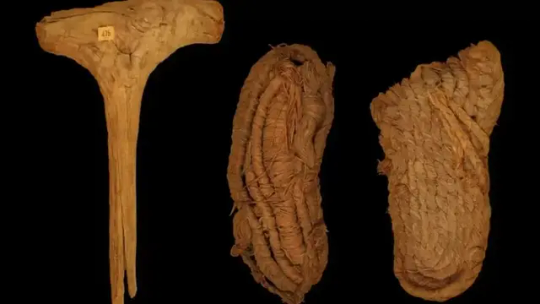
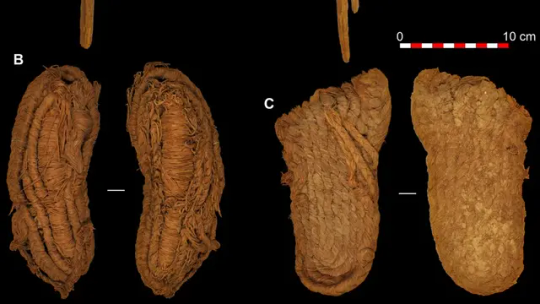
6,000-Year-Old Sandals Found in a Spanish Cave are Europe’s Oldest Shoes
New analysis has identified the oldest shoes ever discovered in Europe, according to a study published this week in the journal Science Advances.
The 22 woven sandals date from 6,000 years ago, radiocarbon analysis found in the study led by researchers at the Autonomous University of Barcelona and Alcalá University in Spain.
The ancient footwear, along with Mesolithic baskets and other tools, was first discovered back in 1857, when a cave in southern Spain was looted by miners. However, when the artifacts were first dated, in the 1970s, they were identified as being about 1,000 years more recent than this latest analysis found.
The very dry conditions within the cave were ideal for preserving perishable materials, the researchers said, and allowed the preservation of a prehistoric burial site complete with partially mummified corpses, accompanied by baskets, wooden tools, sandals and other goods.
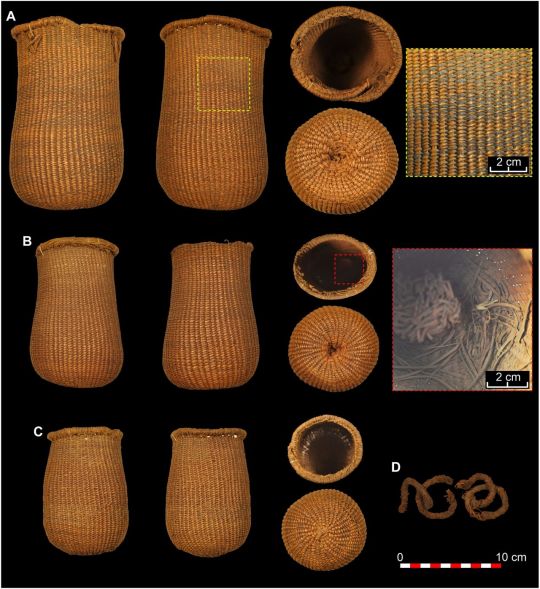

The objects are “the oldest and best-preserved set of plant fiber materials in southern Europe so far known,” María Herrero Otal, one of the study’s authors, said in a statement, adding that they demonstrate “the ability of prehistoric communities to master this type of craftsmanship.”
When Spanish archaeologist Manuel de Góngora y Martínez visited the cave in 1867, 10 years after the looting, he gathered the remaining artifacts, including the sandals, and gave them to museums in Madrid and Granada, where they have been studied by researchers, the study added.
The sandals were made of grasses as well as other materials, including leather, lime and ramie bast, a type of natural fiber.
Using the descriptions provided by Góngora, the study hypothesizes that the bodies were buried wearing the sandals.

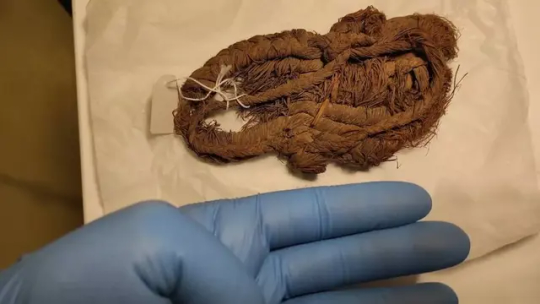
Some sandals had clear signs of wear, while others appeared never to have been worn, suggesting that some people had clothing made especially for their burial.
The researchers also studied several baskets and other wooden artifacts in the collection. These objects “open up groundbreaking perspectives on the complexity of Early-Middle Holocene populations in Europe,” they said, adding that most knowledge of past societies is drawn from durable artifacts rather than perishable ones such as baskets. The Holocene is the current geological epoch, which began 11,700 years ago.
Both the baskets and sandals suggest that the makers had an extended knowledge of the plant resources in the local environment as well as a high level of expertise, the researchers noted.
“The quality and technological complexity of the basketry makes us question the simplistic assumptions we have about human communities prior to the arrival of agriculture in southern Europe,” Francisco Martínez Sevilla, one of the study’s authors, said in a statement.
The study also found that the objects were deposited at the site at two very different times during the Early and Middle Holocene eras. The first phase was related to the Early Holocene hunter-gatherer populations, and the second phase to Middle Holocene farmers, researchers said.
By Issy Ronald.


#6000-Year-Old Sandals Found in a Spanish Cave are Europe’s Oldest Shoes#the oldest shoes ever discovered in Europe#Cueva de los Murciélagos#the Cave of the Bats#Andalusia Spain#ancient artifacts#archeology#archeolgst#history#history news#ancient history#ancient culture#ancient civilizations
128 notes
·
View notes
Text
History of Corinthe from its Foundation, part 1
THE Parisians who nowadays on entering on the Rue Rambuteau at the end near the Halles, notice on their right, opposite the Rue Mondétour, a basket-maker's shop having for its sign a basket in the form of Napoleon the Great with this inscription:
NAPOLEON IS MADE
WHOLLY OF WILLOW,
have no suspicion of the terrible scenes which this very spot witnessed hardly thirty years ago.

It was there that lay the Rue de la Chanvrerie, which ancient deeds spell Chanverrerie, and the celebrated public-house called Corinthe.
The reader will remember all that has been said about the barricade effected at this point, and eclipsed, by the way, by the barricade Saint-Merry. It was on this famous barricade of the Rue de la Chanvrerie, now fallen into profound obscurity, that we are about to shed a little light.
May we be permitted to recur, for the sake of clearness in the recital, to the simple means which we have already employed in the case of Waterloo. Persons who wish to picture to themselves in a tolerably exact manner the constitution of the houses which stood at that epoch near the Pointe Saint-Eustache, at the northeast angle of the Halles of Paris, where to-day lies the embouchure of the Rue Rambuteau, have only to imagine an N touching the Rue Saint-Denis with its summit and the Halles with its base, and whose two vertical bars should form the Rue de la Grande-Truanderie, and the Rue de la Chanvrerie, and whose transverse bar should be formed by the Rue de la Petite-Truanderie. The old Rue Mondétour cut the three strokes of the N at the most crooked angles. So that the labyrinthine confusion of these four streets sufficed to form, on a space three fathoms square, between the Halles and the Rue Saint-Denis on the one hand, and between the Rue du Cygne and the Rue des Prêcheurs on the other, seven islands of houses, oddly cut up, of varying sizes, placed crosswise and hap-hazard, and barely separated, like the blocks of stone in a dock, by narrow crannies.

We say narrow crannies, and we can give no more just idea of those dark, contracted, many-angled alleys, lined with eight-story buildings.

These buildings were so decrepit that, in the Rue de la Chanvrerie and the Rue de la Petite-Truanderie, the fronts were shored up with beams running from one house to another.

The street was narrow and the gutter broad, the pedestrian there walked on a pavement that was always wet, skirting little stalls resembling cellars, big posts encircled with iron hoops, excessive heaps of refuse, and gates armed with enormous, century-old gratings. The Rue Rambuteau has devastated all that.
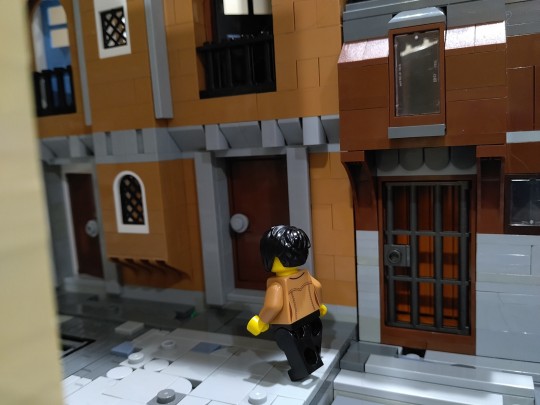
[...] The passer-by who got entangled from the Rue Saint-Denis in the Rue de la Chanvrerie beheld it gradually close in before him as though he had entered an elongated funnel.
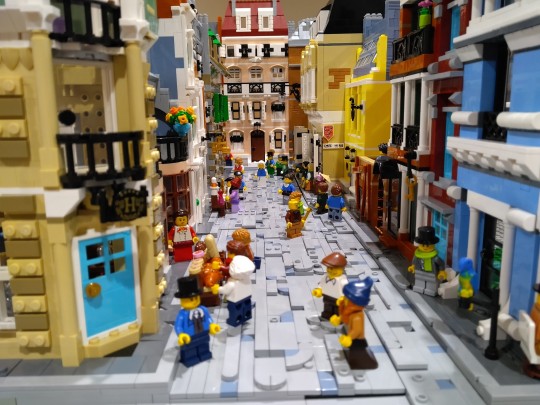
At the end of this street, which was very short, he found further passage barred in the direction of the Halles by a tall row of houses, and he would have thought himself in a blind alley, had he not perceived on the right and left two dark cuts through which he could make his escape. This was the Rue Mondétour, which on one side ran into the Rue de Prêcheurs, and on the other into the Rue du Cygne and the Petite-Truanderie. At the bottom of this sort of cul-de-sac, at the angle of the cutting on the right, there was to be seen a house which was not so tall as the rest, and which formed a sort of cape in the street. It is in this house, of two stories only, that an illustrious wine-shop had been merrily installed three hundred years before.

In the time of Mathurin Regnier, this cabaret was called the Pot-aux-Roses, and as the rebus was then in fashion, it had for its sign-board, a post (poteau) painted rose-color. In the last century, the worthy Natoire, one of the fantastic masters nowadays despised by the stiff school, having got drunk many times in this wine-shop at the very table where Regnier had drunk his fill, had painted, by way of gratitude, a bunch of Corinth grapes on the pink post. The keeper of the cabaret, in his joy, had changed his device and had caused to be placed in gilt letters beneath the bunch these words: "At the Bunch of Corinth Grapes (Au Raisin de Corinthe"). Hence the name of Corinthe. Nothing is more natural to drunken men than ellipses. The ellipsis is the zig-zag of the phrase. Corinthe gradually dethroned the Pot-aux-Roses. The last proprietor of the dynasty, Father Hucheloup, no longer acquainted even with the tradition, had the post painted blue.
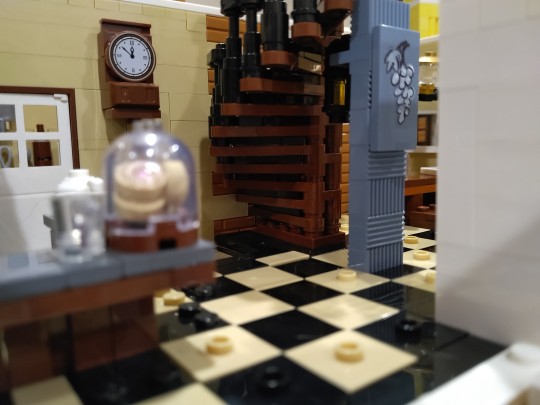
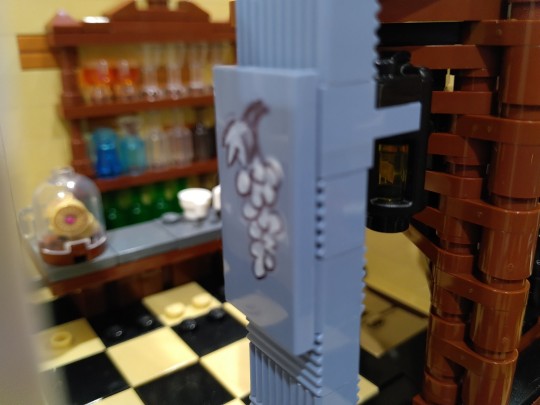
44 notes
·
View notes
Note
DRABBLE TIME :D
🫂 💕(forehead plss) 🤝🏽 ✊🏽 🥰 💪🏽
(Okay fineee u got me yes I just wanna read some DAMN GOOD HEARTWARMING FLUFF so I can cry over my singleness)
(Also I hope it's okay for me to request that this be a bucky x y/n (f) fic 👉🏽👈🏽 but if not pls feel free to write it about characters of ur choice!! I'll read whatever you write regardless of who it's about 🥰)
a/n: Thanks for the ask :) Here's 800 word of being in stupid love with Bucky Barnes. Angst and fluff and lots of snuggles. Title from "Moon River" <3
28 Ways Masterlist

"dream maker, heart breaker"
When God made Bucky, he must have wanted it to hurt.
Looking at him for too long is like moon-gazing through a high-powered telescope. You don’t expect it to be painful when the light hits your eye because you forget how much light there actually is.
Most nights, it’s a silver dollar, hanging isolated and beautiful that from where you stand, its visible scarring— aftermaths of a distant past, blurred by the stretch of space— doesn’t seem real.
As in, you forget there’s so much to see.
You forget there’s an entire other side tucked behind its back that observers only manage to glimpse if they’re lucky and are briefly offered just an auspicious quiver.
You think there’s so much moon in him.
Ancient history in the rise and fall of his topography: the delicate shifts of his skin and bones; the hot red blood that ran and how much of it erupted during the epochs of his life. How it must have flowed like seawater as he shivered alone in a silent, frozen landscape.
His many faces: his alert, cunning eyes, steely and knife-sharp; his cheeks, rounded and high with color, when he laughs and it surprises everyone. When humor catches him off-guard and there’s a quick bark of joy slipping out before the back of his hand hides it again.
What wondering minds conceive when they make stories of him: a wild animal, a traveler in the shade of a tree, a disgraced exile, a divinity.
He carries it all with supernatural grace. The weight of his entire being locked into a sequence he never signed up for. Only existing as a casualty of collision, a long line of coincidences that travelled and travelled until they made impact, that shattered and burst and finally returned to life metallic.
And yet, so bright.
It’s approaching dawn now and he’s a splinter of a thing in your bed.
Curled up into the sheets, hair a wild mane of auburn where early sunlight favors it. His side profile pressed into your pillow, rolled carelessly over until he was pushing you toward the border.
You couldn’t see him then but heard him murmuring and felt him shaking as he chased blindly. Just the faintest whimpers for attention as his fingers reached out, his powerful body folded as if in utero.
And it was a silly thing that broke your heart, despite how full your heart is these days with love for him.
He’s still tangled up in a dream, movement beneath his eyelids giving him away. His fingers twitching, one leg slotted beneath your own beginning to flex and bend.
You snuggle closer to him, turn until you can clutch him to your chest, rubbing his silver shoulder—up and down the red star that seems to constantly burn him alive.
His brow furrows, tormented with agony. His hand clenches into a boulder behind your back. His speech is slurred and Russian, rattling numbers and compliance and you’ve learned enough to dissect the vocabulary, can parse out his desperate pleas of sir-ready-missioncomplete-missionreport-itdoesnothurt-Iwillobey-Iamnothing-Iamaweapon-Iamyourdog—
He makes a curtailed noise. A quick, high whine like a pained animal, so you let him seek out your body heat, let him burrow into your neck and cling to your waist as his teeth chatter.
And there’s not much more can do when he falls apart like that. Nothing you can say or assure or shout out as much as you want to in order to wake him. He won’t—he never wakes. He only continues to cross the memory, dragged routinely across the deep sky until morning. Sometimes it goes on for hours. Sometimes it goes on all night.
But now the sun is ascending, chasing away the dark, tucking his fears back into the other side of the world and Bucky calms with it, crying tamped down to only a few sniffles.
You brush away the wet hair that has stuck to his cheeks and forehead, wipe his brow and press your lips to him, tasting tears and sweat.
You do it again, another kiss to his forehead, and again, leaving your own mark, impacts of softness, and love, and everything he needed and couldn’t receive for so long.
“Sorry,” he stirs, “woke you up—” but you shush him with a kiss to his nose, then one to his chin.
“Sweetheart,” he murmurs, shy and embarrassed, but you’ll have none of it, especially when he doesn’t pull away, only leans in to receive more because he wants it as much as he’s needed it and you’ll give him everything, every night.
Your exiled divinity. Your bright, bright boy. Your moon and his many faces.
You kiss all of them again—and again, and again, and again.
#bucky barnes#bucky barnes x reader#bucky x reader#bucky barnes x you#marvel#mcu#reader insert#fanfiction
56 notes
·
View notes
Text
Slugcat Ocs P1
These are the slugcats that go along with my OC Iterators
The Hierophant: You are the Heirophant, a slugcat that’s highly attuned to the deeper mysteries of the world. In your pursuit of knowledge you have traveled far and wide, and arranged for yourself meetings with each Iterators whose path you’ve crossed to converse with them. They’ve been surprisingly helpful, you both seem to solve the same problem after all. These Iterators will not be the last you speak with in your pilgrimage.
Goal: So I imagine you just straight up start with max karma for this fellow, and your goal is to convince each iterator to meet with you and discuss the great problem. You’d carry a little data pad where you record their answers, which I imagine in this case would be lore on ancient philosophy or something to that effect.
Starting area: You’ll be starting by jumping down into Age of Storms city, the Tempest Tossed metropolis. Extreme winds and a whole slew of vicious arias attackers stand between you and entering Age of Storms can, though you’ll need a specific item from the city first if you’re to ensure a meeting with him.
Colors: A deep blue slugcat with gold speckling, it’s physical eyes are shut but it’s spiritual eyes are blown wide open.
The Terminarch: You are the Terminarch, pale, sickly, and stunted but possessing a will fit to move mountains. You are the last of your kind, a remnant that has outlasted both the age of rain and the age of snow. Now, facing the dawn of the next epoch you seek to meet with the last of the rain gods, beings which your tribe had once worshipped so you may pass on in peace.
Goal: Your goal is to make the pilgrimage to Built Slighlty Sideways, who is ironically the last living iterator locally. You’re both the last of your kind and as such it’s fitting you both pass on in each others company. Of course you’d change things if you could, but there’s no hope for that… right?
Starting area: You start in Whispering Wastes, an area blanketed in a perpetual purple haze, if you’d had the ears to listen you’d hear the dying whispers of Signals Lost in the Night on the wind. You would have a small portable radio you found somewhere, possibly one of Signals antenna? It would let you listen in to the final moments and other residual thoughts of iterators.
Colors: Albino, you’ve got nearly translucent skin and red eyes with poor vision.
Other: Your karma is not lowered by death, is it a symptom of the cycle grinding to an end? Or something else? Beware however! as many species in this distant time are capable and willing of draining your karma from you in a futile effort to escape the end of the world.
The Weaver: You are the Weaver a purposed organism created by Peerless architecture as a messenger. You’ve been many places on her orders but you have a as of recently become suspicious of your creators motives. She has dispatched you to both Applied Blasphemy and Age of Storms in rapid succession, you suspect they are planning something terrible. Perhaps it has to do with the strange glassy liquid you’ve been seeing in your makers bio fabrication labs recently? Either way your maker has gone through great lengths to prevent this information from being shared over the conventional channels.
Goal: You get a choice here, you can either complete your mission and aid your creator and the others in creating a weapon capable of killing even an iterator—if one that will do so slowly— or you can bring your message all the way to Signals Lost in the Night, though the journey will be excruciatingly difficult.
Starting area: You start inside Peerless Architectures superstructure, having just been given your next message to be brought to Applied Blasphemy, your first struggle after leaving her structure is finding a way across the lake and from there dodging BSS’ observers. Apparently your maker doesn’t want her neighbor learning about this project.
Color: they are a black slugcat with an extra pair of arms and insect like joints. They’re capable of incredibly fast climbing and can cling to nearly flat surfaces. Additionally their extra arms mean that you can carry up to four items, though doing so slows you down a bit.
4 notes
·
View notes
Text
Rex nunquam moritur (the King never dies): A personal reflection on HM Queen Elizabeth II
So many have asked me about Queen Elizabeth’s death and where I was and what was I doing at the time. It’s very kind of people to firstly, drop a note of condolence and second, to enquire how I have been since I was away from my blog for over 5 months. So I thought I would share some of my thoughts here.
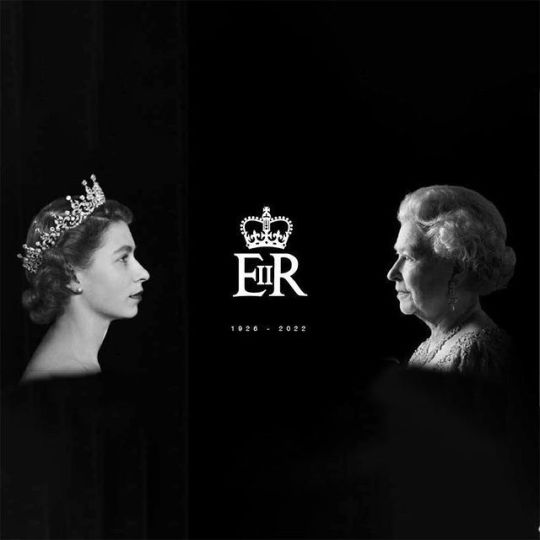
I suppose the sad news of HM Queen Elizabeth’s passing would go down as a defining event for most of us - Brits at least - in the same way one would ask an earlier generation where they were when the Two Towers came down in New York on September 11. Or perhaps ask an even older generation of where they were when the Berlin Wall fell to usher in the end of the Cold War in 1989. Or an even older generation about the day they heard President John F. Kennedy was shot in Dallas on 22 November 1962.
HM Queen Elizabeth’s death has that epochal sentiment to it and already some commentators have rushed to declare the end of the Second Elizabethan Age (not a bad way to be remembered considering we have the first Elizabethan Age under Elizabeth I and of course the Victorian age after Queen Victoria and the rise of the British Empire).
For myself, I was in France on my vineyard. It’s the time of the wine harvest - or vedanges as it’s called here. So I had taken time off from my corporate day job in Paris to help in the harvest of the grapes which is primarily managed by my two cousins and their French families - they gave up the treadmill of the corporate world to pursue their dream of being wine makers. I love coming down here to escape the big city madness of Paris.
Any farmer will tell you Mother Nature always keeps them on their toes and that’s especially the case during the grape harvest season - anywhere between late August and early September. As winemakers they have just one shot a year to get it right. In essence everyone is on Mother Nature’s schedule and need to be prepared for anything that might come their way. The harvest times, as any wine maker will tell you, is a crucial time of the seasonal year, so it requires all hands on deck.

I was out in the fields just finishing clearing up empty cartons and other loose end stuff lying around for the day. I was hot and sticky. I was full of dirt and sweat from my labours since 5am. My hands were calloused and my body was covered in muscle aches and pains. I remember thinking I was looking forward to some traditional home cooking of one of the French wives of my cousins and then later after putting their kids to bed with a nightly story, and then we adults would play our nightly game of poker over a glass of wine and a cigar - and just generally shoot the breeze under the starry night sky. But God, did I stink. I was in need of a shower when I got back to the main house.
Out of nowhere one of the trusted vineyard hands, a young Moroccan man, who was doing his wine making apprenticeship under the careful tutorship of my cousins, came running out to me. He was waving like a banshee and wailing something but not making a lick of sense as he seemed so out of breath. I honestly thought I had misjudged the time and everyone was waiting on me for dinner.
Finally as he got closer I could hear him between his panting, “Madame, La reine est morte! La reine est morte!”
“Qui est morte?” I asked him as he tried to catch his breath.
“La reine, madame.” He said simply.
“Quelle reine? La reine Sonja?”
“Oui, madame.”
“La norvégienne?”
"Je suppose que oui. Madame vient de me dire de vous dire que la reine est morte.”
It never ocurred to me that it was in fact Queen Elizabeth that had died. And so I hurried back to the main house thinking Queen Sonja of Norway had died. I don’t know why but I thought the Queen of Norway had kicked the bucket at 85 years old. 85 years was a good innings.
I could already feel a pallor of sadness fall upon me. When I got into the main house after kicking off my dirty wellies, I was met by both my English cousin and my Norwegian cousin and their French wives sitting glumly around the sprawling kitchen table and their infant children running around creating chaos in the hall way.
Also present was an English friend from my ex-army days where we both served in Afghanistan, except she was an officer in the Intelligence Corps and I flew combat helicopters. She came with her partner, another old friend, to stay at the vineyard and help out with the harvest as a fun experience. She seemed to be suppressing some tears. There were two other French couples and their kids from Paris who had also come down to help in the harvest.
One of the French wives gave me a glass of wine and gave me a consolatory hug and said she was so sorry to hear that the Queen was dead. I asked how and someone said she died in her sleep. I went over to hug my Norwegian cousin as he seemed in need of one. My English cousin did his best to appear stoic. No further words were spoken. Funny thing is no one mentioned Elizabeth by name as they just kept saying the Queen over and over and so I was none the wiser.
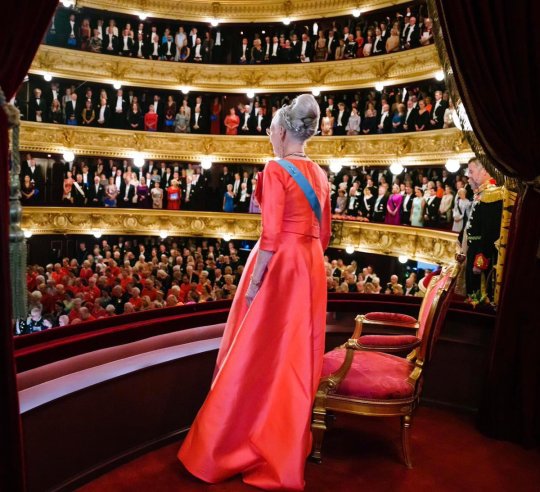
I then remembered my poor Norwegian mother. I got up and told everyone I had to call my mother and console her. My mother as it happens was in Copenhagen, Denmark. She had been invited as a guest to attend the celebration of Queen Margrethe of Denmark’s 50 years on the Danish throne. In attendance also were the royal families of Norway, Sweden, and Greece as well as other invited guests, both official and unofficial. The centrepiece of the festivities was a gala performance at the Det Kongelige Teater (Danish Royal Theatre) in Copenhagen.
I managed to get my mother on the phone who was having dinner with friends. I told how sorry I was to hear of the Queen’s death. She said she had already heard and the sad news had cast a shadow over Queen Margrethe’s celebrations. She told me she got news that the gala performance would go ahead but in a more subdued form and there would be also the inevitable minute’s silence in honour of the passing of the Queen. I asked her if she knew how poor King Harald V was taking it. She said she didn’t know but she imagined he was deeply saddened. I then name checked all the other Norwegian royals and some of my mother’s Norwegian friends also present to ask how they were holding up.
This kind of crossing of wires went on a for a while before my mother got a tad exasperated at all my questions about how the Norwegians she knew were coping. Looking back it was quite silly and comical as Norwegians aren’t expansive when it comes to sharing what they really feel or giving minimal information about anything.
The penny still didn’t drop when she said I should try to contact my Anglo-Scots father who was back in England and commiserate with him as he was quite shaken about the news. She mentioned a few great aunts and uncles on my father’s side to send my condolences to them. I thought that an odd thing to request as I thought it would be more appropriate to contact members of my Norwegian side of the family. But I didn’t think further upon it after we finished talking.
I walked back into the kitchen and it was chaos with everyone doing something to get the meal ready and the table set for dinner. With all the clutter and the chatter I just couldn’t hear myself think.
It was only until I wandered into a nearby living room to compose my thoughts but instead I ran into two of the little pre-teen daughters of both my cousins drawing and colouring pieces of paper on the table. I looked over their shoulders to see what they were doodling a stick portrait of a queen in a sparkling dress, a blue sash, and white pearls and crown on her head. I then saw the British Union Jack flag and gently enquired why they did that when the Norwegian flag was different. They looked at me as if all adults are stupid. Because Queen Elizabeth was queen of Britain, not Norway, they chimed together.
Then the penny dropped.
All that came out of my mouth was a small ‘oh’. I felt a little dazed as I wandered back into the kitchen oblivious to everything going on around me. I took a hot shower and I remember a strange empty feeling gnawing in the pit of my stomach. I forgot my muscle aches and pains and I even lost my appetite at the dinner table. It was quite a solemn evening. It reminded me of the only other Royal death that I’ve experienced, or rather seen the grief in others, and that was as a very little girl watching others react to the sudden and tragic death of Princess Diana way back in 1997.
As the evening wore some of our neighbouring French vineyard owners also dropped by to express their condolences and to see how we were holding up. They brought home made pastries and of course a few bottles of their wine. The kitchen was overflowing with people coming in and out and soon spilled into another room and outside. What I love about where we are is how everyone comes together that goes beyond being civil to sincerely caring for one’s neighbours. Despite the sombreness of the occasion, the atmosphere was light and earthy.
The rest of my evening was spent phoning around other members of my family and trying to get their news.

My father was his usual stoicism personified but underneath I could tell he was downcast and deeply wounded. This was a man after all who did his expected time (and duty) as a junior army officer in one of the seven distinguished regiments belonging to the Household Division (Septem juncta in uno or 'seven joined in one'), and therefore served in a long line of soldiers defending the Queen herself. But he also served the Queen’s household in another capacity for a brief time.
He first got news that something was amiss when he was at his gentleman’s club in St. James’s to join a politician friend of his for a spot of lunch; this friend had been in Parliament for Liz Truss’ first Prime Minister’s Questions where the news first broke of the Queen’s worsening condition; and both PM Liz Truss and Sir Keir Starmer, the Labour opposition leader, scurried off out of Parliament.
The rest of the afternoon my father just heard the odd murmurings but paid no real attention. Only by the time he had joined friends for dinner at a small restaurant in Chelsea did he find out about the Queen’s passing from the sombre mood of everyone in the restaurant. It was surreal, he said, in that many dining patrons and even waiting staff were crying or shaking with emotion. He had to comfort one Belgian waitress serving his table - who was in Britain as a postgrad student - and who just couldn’t hold it together. Other people were visibly upset and the atmosphere was like being in a morgue.

I never imagined I would feel any sort of grief at the passing of a public figure. At those points in my life where someone close to me has died, the hours and days afterward felt heightened, timeless and liminal: as though the world has grown thin, and unimaginable truths or possibilities might hover just out of sight. When that mood governs your every waking moment, and that of others too, going about the ordinary business of living and working feels absurd.
In my case personal memories of meeting HM Queen Elizabeth II came flooding back. Perhaps ‘meeting’ is too strong a word - more like basking in her magical presence is more acurrate. I won’t share anything here too much as I value my privacy and the privacy of my family.
I will share that one of the times I really met her was at the Ghillies Ball at Balmoral Castle. My family had a cottage retreat in a village up on Royal Deeside - often used as a halfway house to go to the shooting parties at Scottish estates further north. From my great-great grandmother to my grandmother onwards they would get invitations to the ball.
I got an opportunity to go too as a I was now a teen girl. I had a wonderful time dancing and feasting. The highlight of which was to share a reel with the late Prince Philip who enjoyed making off colour jokes which I loved. He also gave me punch laced with whisky. I wouldn’t say he was responsible for my descent (ascent?) into whisky drinking but at the very least I did have a royal seal of approval.
From then on I would - in some cases literally - bump into different members of the royal family at the Royal Caledonian Ball. It’s the oldest charity ball in the world helping to raise funds for worthy causes and the Queen was a huge supporter. She went to her first ball in 1946 and many others since. Going to the Royal Caldedonian Ball has always been a guilty and indulgent pleasure.
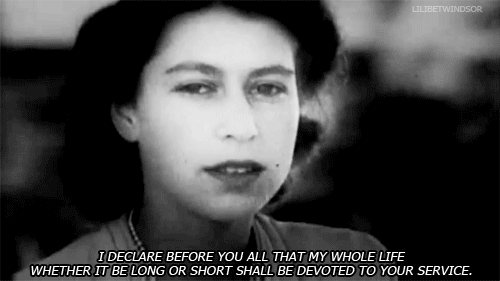
Queen Elizabeth’s death matters in the same way you might miss salt in your food. It’s there and you expect it to be there but you’ll definitely notice it when it isn’t.
Part of the hard-to-explain grief that many British people feel at the Queen’s passing is related to how staggeringly rare that level of self-restraint is today. Narcissism is everywhere. Every feeling we have is bound to be expressed. Self-revelation, transparency, authenticity - these are our ‘modern’ values. The idea that we are firstly humans with duties to others that will require and demand the suppression of our own needs and feelings seems archaic. Elizabeth kept it alive simply by example.
With her death, it’s hard not to fear that so much she exemplified - restraint, duty, grace, reticence, persistence - are disappearing from the world. As long as she was there, these virtues were at the centre of an idea of Britishness that helped define the culture at its best. Perhaps the most famous woman in the world, she remained a sphinx, hard to decipher, impossible to label. She was not particularly dashing or inspiring. She said nothing surprising. She was simply the Queen. She showed up. She got on with it. She was there. She was always there.
Whatever else happened to the other royals, she stayed the same. And whatever else happened in Britain - from the end of Empire to Brexit - she stayed the same. This is an achievement of nearly inhuman proportions, requiring discipline beyond most mortals.

As one commentator put it well, Elizabeth was an icon, but not an idol. An idol requires the vivid expression of virtues, personality, style. Princess Diana was an idol - fusing a compelling and vulnerable temperament with Hollywood glamour. And Diana, of course, was in her time loved far more intensely than her mother-in-law; connected emotionally with ordinary people like a rockstar; only eventually to face the longterm consequences of that exposure and crumble under the murderous spotlight of it all.
Elizabeth never rode those tides of acclaim or celebrity. She never pressed the easy buttons of conventional popularity. She didn’t even become known for her caustic wit like the Queen Mother, or her wild antics like Margaret. In private as in public, she had the kind of integrity no one can mock successfully.
Duty, sacrificial service, and honour....without power. That’s the role of modern royalty and one Elizabeth personified for many people.
And that’s why a royal personal scandal can be so crushing. When they fail and fall, it hits differently from the failures of ordinary politicians. Their fundamental purpose is to embody a certain national ideal.

But there is also immense meaning when a monarch lives the values their role demands. Queen Elizabeth II lived with honour and did her duty, and in so doing she helped bind together a fractious people. She helped give them a sense of shared identity. No politician can ever do that for politics by nature is tribal.
In her single person, and in her dedication to a selfless life of public service, our late Queen embodied continuity across nearly a century of seismic change. She sailed serenely through the dismantling of the British Empire, accepting without demur its transmutation to a ‘Commonwealth’ and her role as figurehead of that entity.
In this way, more than any other single individual, she both guided and personified Britain’s transition from the most sprawling empire in history to… whatever it is we are now after Brexit. In her calm and stalwart presence, Great Britain managed to act as though nothing had really changed, or if it had it was all for the best. Because that’s what we Brits do best, we muddle on as best as we can hoping it will come right in the end. With our Queen still soldiering on, at some level it all felt like the same big story, and we could argue in relative emotional safety about what the next century of ‘Modern Britain’ might be. However one could answer that question, all of us could put off coming to any firm conclusion, as long as she was there to hold it all together.
Now she’s gone.
Grief will give way to acceptance and life will have to go on.

No doubt alongside the inevitable internet ghouls loudly rejoicing for the attention seeking hate-clicks, we’ll hear renewed calls from the ever-present (and, to date, mercifully unpopular) republicans, to dispense with the monarchy in favour of something more ‘democratic’. This is an irony of course for those of us who are historically literate, for the very presence of a constitutional monarch has served, for some 334 years, as our guarantor of democracy in Britain.
You needn’t be a monarchist to believe in the importance of service, sacrifice, stoicism and nationhood – to believe that history is there to be learnt from and built upon, rather than rewritten and cleansed. A confident, truly democratic nation should know where it has been as well as where it is going. And, indeed, the younger royals seem as allergic to many of these ideas as any other section of the establishment. But with the death of Elizabeth you can’t help but fear that, if we’re not careful, those values she represented will pass into the history books along with her.

I for one will raise my glass to honour my Queen, Elizabeth Windsor, for a life well lived and as embodiment of all that is good about Britain.
And I will toast Charles III as my king. Whatever criticism of his actions may have been justified in the past, he deserves the loyalty and enthusiastic support of the whole nation for the future. I shall be praying under my breath that he finds the instincts that served his mother so well for 75 years through continuity and change.
God save the Queen. Long Live the King.
#HM Queen elizabeth II#elizabeth II#monarchy#britain#King Charles III#charles III#republic#sacrifice#service#duty#honour#history#british history#personal
79 notes
·
View notes
Text

4/5 Epoch Maker
2 notes
·
View notes
Text
I really love dactylic hexameter, (technically dactylic duodecameter) it's so annoying but so fun. I might write the whole book like this.
🌊🌋🧝🏽♂️🧝🏽♀️🌋🌊
The son of Ivaldi, king Torvyn of Falu lay as if dying, with his wife by his side
Thora the daughter of the field and the forest doomed in her dreams was his spring born bride
For long had it been since she first heard the whisper a prophecy echoed from a space beyond time
For all that was green and all that was growing bent towards a fate where futures align
Long passed were the days, when reeling with terror the elven maid sought out Ivaldi’s son’s feet
And struck with compassion, the wise lord of Falu in her green eyes did sorrow meet.
For in those days his house was ennobled, across the ancient Earth
None were so blessed as the sons of Ivaldi in their wisdom or their worth
For in the time of the elven king’s epoch they learned the secret ways
and captured the spark of the lord of the lightning and the storm cloud grey
For it was wise Torvynd who spun the gold plaits to crown high heaven’s queen
So it was that the goddess sent out far sighted Thora to fix in fate her dream
“oh, son of Ivaldi, born of fire and water, who spun the golden tress
Heed ye my words for the works of your hands, may curse as well as bless
The ocean will boil the heavens will rage and all things will find their end
Lest you turn aside from the green growing earth and hide from the face of men.”
Hearing the words of the maid of the woodlands, the king looked at last on the earth.
Weeping for all that his works might destroy and wondering at their worth
For mankind in that age were simple and harmless, to a fairy king of ore and ice
The oceans were empty, the stars clear and ancient and he wondered at the awful price
Gathering round his wandering people, cast away from Ivaldi’s doomed shore
He stood beside the prophetess maiden, and spoke to them the grim news that she bore.
So was the realm of fair Falu buried, far beneath the earth where men would not delve
And over its gates and its deep, sacred cloisters, spells were laid in layers twelve
but mighty Havad, that spear wielding warrior, for his brother was dismayed
for it seemed that kind Torvynd had banished his wisdom, and into folly strayed
so were the brothers for many years sundered, and as the eldest before
Who sailed his ship across the ocean to seek some long imagined shore
Tended they their kingdoms for many long centuries and ever deeper made Myrkalfar home
By the green grace of queen Thora’s own power, by electrical lamps which glittered and shone
The Myrkalf of Falu established in grandeur, a realm carved from bedrock both secret and deep
But over the lives of the dark elven people their queen’s warning words would echo and creep
In peace they had dwelled through the echoing centuries binding their long lives to the ore and the stone
Seeking for allies King Torvynd Ivaldi, found that in his need, he was quite alone
Rough were the picks and the shovels of mortals, but just as had spoken his wife
Doom had at last found the high king of Falu, and she begged the gods for his life
For an age had the king’s peaceful will kept him sundered from a brother fond of slaughter
Havad in his folly wed his bitterest rival, Brekke the ring maker’s daughter
Bound for so long to the earth and the metals king Torvynd grew weak to his death
For the heart of the king was made of bright copper and it trembled in his breast
“Who will now go to seek aid from those sundered, the House of the Ring and the Spear?”
The noble queen asked with her grandchildren gathered, close so they might hear.
Vigi it was, the oldest and bravest of Torvun Ivaldi’s sons
Who first ventured forth from dark Myrkalfheim, to seek again the sun
Years in the dark had changed them and made them pale and strange to see
And the men who had once looked upon them in wonder turned their backs to flee
Vigi son of Torvynd fell at the cruel hands of a miner with a sharpened rough tool
That which was ancient and dearly beloved fell by the hand of an ignorant fool
Even in his grief, King Torvynd Ivaldi would not doom the foolish men
So on the still night of the high midsummer his sadness shook the earth again
The deeply delved mines of industry driven to scratch up flakes of shining ore
turned the queen’s augurs to history written in the cruel annals of war
The tunnels came crumbling down all together, sealing the place where Myrkalfheim hid
But short were the days, as his power waned, and council soon the wise king bid
The Son of Ivaldi, King Torvyn of Falu, lay as if dying, with his family near
For a mortal had knocked on his doors made of stone and all within could hear
“Who will go out, from our fortress of stone, to brave again the cruel earth?
who will seek out my long sundered brother and prove to me their worth?”
“I will go father.” Said the voice of the youngest, Kavas the bright eyed grandson of the king
“for I have never seen the sky or the water, we know nature only in songs that we sing
Long I have learned the story of starlight, and wondered long at the myth of Mankind
Let me go forth to find word of your brother, let me go forth to enrich my own mind.”
Torvyn wept at the words of the boy who had lived not one hundred years in his realm
“I would not have your life put in danger my child,” the king shook his head, his kind heart overwhelmed
“But neither will I make a prison, of a kingdom made for peace. May you succeed where your uncle could not.
Therefore, you are now released. But heed ye these words, well thou this understand
Mortals have minds which will turn truth to folly and no taker of life may enter this land.”
6 notes
·
View notes
Note
Not ao3 wrapped but it/your answers made me think and wonder.
What is something in Wicked Game, not Tucker related, that surprised you when writing?
And what was something that surprised you from the responses to Wicked Game? Either as a whole or specific chapter or scene?
As a whole, I think the most surprising thing about Wicked Game, to me, was that so many people responded to it.
It's not a comfortable fic. It deals with dicey issues. It's a shipper fic, to a point, but the relationship in that fic is unhealthy and damaged and needs a lot of work to be something good for either of them.
It highlights the worst parts of both of them (though it really does highlight Elliot's flaws more, tbh).
I am a very new, late comer to the SVU franchise. It was into S24 when I came aboard.
So the fact that it picked up traction, to me, was very surprising. Because the readers had to trust me to take them on that journey, which is a big ask for a relative newbie in that fandom.
Like, usually, with fandoms, especially big ones, you jump in with a few quick one shot PWPs, because... while angst pays the bills, smut is the money maker. You build readers. THEN you hit them with "oh, by the way, now that you trust me and I have your attention, here's an epoch of angst and tears and bloodshed and draaaaammaaaaa".
I entered SVU with that last one and have yet to really do a PWP one shot.
It's been discussed before, that I originally saw Wicked Game as a much shorter fic, and much darker. So I guess more surprise came with how much story there actually was in it and tempering the outright darkness did give it a depth that ultimately was truer to the characters, but also became insidiously darker as a result.
I think the limitations I placed on myself for this fic also surprised me. It was probably a good thing. Because... usually I start from a canon place and then take characters on a journey, but in this fic I kept them in canon AND on a journey that totally defied canon... and in doing so had many limitations on what I could write and when. The plot of the actual show hemmed in what I could write for them.
But also? After coming off such a long hiatus, it actually developed my creativity. I had to write around stumbling blocks that, if they weren't there, I wouldn't have had to think so hard about it, so the fic would have been totally different and - most likely - not as good. Those limitations saved me. Which is weird, because it's not how I usually work.
Actually writing, finishing the fic, writing so much, and keeping my muse alert throughout the whole thing was a huge surprise to me. I was so burned out by the time I stopped that I thought for the longest time my fic days were behind me.
Hmm... I think all of that was your second question, wasn't it?
The first was... something not Tucker related (aka, Jacqui, don't give me the same fucking answer you always give, ffs, tell me something new! ;) )
Hmmm... How rich the ancillary characters became. The Stabler kids had personalities and stories of their own. Kathy had a back bone, but wasn't a bitch. Munch and Fin and Cragen had their own little outsider perspectives and motives (and yes, even He Who Shall Not Be Named also had more to say than I thought). The Dom Olivia visited, Mistress Anna, had a life of her own. Their couple's therapist had so much to say.
OMG. Mistress Anna. That was a surprise. Like, Wicked Game is a M/F fic all the way, but Mistress Anna entered all "where's the gay ladies at?" and bought the biggest F/F vibe. My brain just sighed and went "oh, yes, we're writing f/f again, let's go!" and I had to try really hard not to make it f/f. I couldn't stop Anna from having a thought or two about Olivia, but... who can blame her, really?
@dahllaz, you always bring the deep thoughts out of me. :D
2 notes
·
View notes
Text
I have developed a new youtube strategy and if I don't write it down I'll forget but it's working nicely to find wholesome and delightful woodworking stuff I would never have otherwise found/looked at.
ah this is going to go long so executive summary: this is not really about my new youtube strategy but it is about youtube stuff I like and why. And a bit about my youtube strategy I guess. and how I have autism lmao.
For instance this guy:
youtube
makes very quietly-spoken, mostly shop footage and talking to camera (and a bit of inserted reference footage or pov shots, too) videos, making nice furniture out of nice hardwoods and self-made recycled skateboard plywood.
This all delivered with an affect my wife wife described as "radiating warmth and light" and a genuinely engaging and crucially understated enthusiasm. perfect blend of cali skater zen and also manual crafts zen.
Obligatory #youtube grammar notes: nothing egregious so far! One word really caught my attention (not enough for me to, like, remember what it was for sure - I think it was furthermore?), as being far enough away from exactly right as to be jarring also (Andrew if you ever read this I am trying very hard to write this in a way that doesn't seem, like, aggressively negative but if it does, [and this is unsolicited criticism so why wouldn't it] as a countermeasure: you're doing great! one and a half weird words in idk half an hour of footage is frankly incredible. and your videos are lovely. thanks!). The 'half' was one instance out of several uses of 'itself' also hit wrong but I can't explain why even to myself so who cares.
Anyway, it's exactly my shit except a lot of his thumbnails look like high energy sfx-heavy youtube maker stuff yelled at me by a bro (Sorry again Andrew once again you are doing great!) which I would never click on except for my grand strategy of:
subscribe early, subscribe often
just like follow links in videos when you watch a nice video and the presenter says 'inspired by a video from ...' - if they make the kind of videos you want, there's a better than average chance people that inspire them do too.
Yes, the second thing should have been blindingly obvious, but I have a medical condition and don't have to notice things.
Mostly it's that the links are now in the readmore of the description field, and I usually don't read those because they register in my brain as post signatures, so I maybe read the whole readmore once per channel.
(for the sake of internet epoch claiming the relevant signatures are on usenet)
That is, I expect the description to have the same content all the time after the obligatory first line modification (i.e. the actual video description text). There's usually a huge identical section of socmed links, affiliate links to products used in the video, affiliate links to endorsed products/channel sponsors generally.
So I didn't know that sometimes there are video/channel links in there, ok? Also there's a popup info panel but I think I adblocked it lmao.
Anyway. Subscribe early, subscribe often, though: Because windows just shuts itself the fuck down whenever it wants, and chrome no longer restores smashed windows by default (presumably for ultimately surveillance-enhancing reasons), and I have watch history turned off on youtube (yeah I know but also listen being paranoid about the internet is my actual job I am allowed to be a weirdo if I want), once I open a linked video in a new tab or whatever, if the video looks cool I subscribe immediately, because I won't watch it now and I'll lose the tab tomorrow.
Anyway this is probably exactly the usage model youtube would like me to have, but because I have watch history turned off I don't get youtube's """highly curated""" recommended bullshit, I only see <search results for niche interest query> and stuff recommended from videos I'm already subscribed to. So like sort of their model but much more actually useful to me.
cool strategy bro
but yeah the real question is hey do you know any more channels like this for carpentry/metalwork/basically any craft stuff? hit me with yr haberdashery yr leatherwork your embroidery - but not cooking for some reason. because they are extremely important for my little mental health right now cheers
#woodworking#youtube#recommend me stuff#carpentry#recycled skateboards are excellent and I should go chat to the local shop#youtube grammar
2 notes
·
View notes
Text
i think its incredibly funny that if you look at the cast you can tell. who my ocs are and who are logan's
or at least i can because their ocs tend to change the entire narrative
#i mean of course i can but also#zero is the biggest one. he technically doesnt even fit into my worldview (which makes him great. seriously)#zero: how about i change this entire story#vlad is also a logan oc and he is Also. like about comrades and connections but using them for harm (epoch)#or like. striving for a goal that isnt good even if it serves his people etc that kind of thing#the nameless quartet is also logan's but thats recycling some of their ocs in the first place :3 for fun. also we need bodies with#personality you know#idk#literally almost everyone else has been my oc first and then fleshed out#mara's shit#destiny has also changed quite a bit since logan got their hands on him. and entropy is both of ours#i need to convince them to make more ocs but also oops i keep making more people#chronic oc maker mara
4 notes
·
View notes
Text
Drumming in the Deep
(no this is not a Syfos post, sorry)
[turn 16: (2+3)+(5+3) = 13, 13-3=10]
In the southwest of the underworld lies a long neglected tunnel, narrow and winding, going far beyond the reach of any states and unmapped by explorers. In the chaos of the great war many Tiktik flee here, some in a circadian search for salvation, and but most simply taking shelter.
But the most eager among them go to far, and these tiktik hear an accursed rhythm. The rhythm burrows into their minds, and takes control of their limbs until all they do is tap their feet, while slowly starving ti death, in a horrific mockery of the feastday dances much beloved by the Tiktik.
The acoustics of the underworld is strange and an echo can carry many leagues, so soon vast stretches of the underworld is beset by the Earworm called the Dancing Plague. Its results are unpredictable; sometimes a victim can shake it off with no more effects than a few irregular spasms, sometimes just the whisper of an echo in the distance is enough to render an entire caravan mortally afflicted. To protect themselves, cities start placing loud bells, drums, trumpets, and other noise-makers on their walls and outskirts, to deafen out any malicious echoes, and travelers cover their ears with layers upon layers of protective fabric.
But while there are countermeasures, these leave you vulnerable to other dangers that might lurk in the dark, so the upshot is that travel in the underworld becomes even more dangerous. Luckily this means that warfare is also increasingly risky, and fighting cools down. There is no true peace, and no formal agreements, but for now at least, the epoch of intense underworld warfare is on pause
3 notes
·
View notes
Text
Three Houses. Three Hopes. Three Countries. Three-and-a-half routes. This game sure loves its trinities, doesn't it? The pattern on Jeralt and Byleth's clothes include an inverted Celtic trinity knot, funnily enough.
How about we go even further and invoke a trinity of draconic gods for this world? Sothis wouldn't be the only one out there...
And so, for your viewing pleasure, here be my bloated headcanon of the three gods of Fódlan's world.
Enjoy the saga of the three gods and the romance that struck two of them: The Fell Star of Fódlan...
...and the Wise Father of Almyra.
In the beginning, hanging in the distant sky above this world, there were three stars. They lingered silently like sentinels, with their gleam brightest up north during times when the world was cold. The peoples who dwelt on this faraway planet could only speculate the true nature of these three stars.

All of this changed when they descended from the stars themselves. While they were known as many things in their lifetime, they would be first and foremost be known as dragonkin, from the forms that they shared in common.
From the white star Procyon, The Carpenter - Shira.
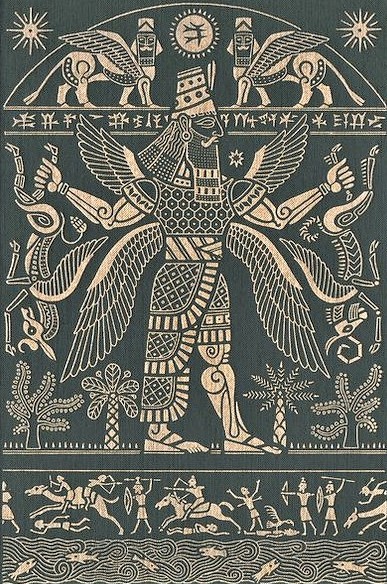
From the blue star, Sirius, the Mother of All Life - Sothis.

And from the red star, Orion, the Wise Father - Sahu.

It is said that the three gods found this world in their journey amongst the stars within the span of a few millenia.
The eldest and most unknown of the gods, Shira, graced the island-country in the shape of a dragon's puff of smoke, known to the people of the current era as Albinea. Together with their children, the Sirrush, they had risen from an unknowing sentinel of a small land to the high law-maker and great steward of lands from the archipelagos of Brigantia to the deserts of Morphis to the Frontier Lands up north. It is said that his most everlasting stewardship was held on the "dragon's head" of Thinis, with some of their kin even reaching the "dragon's body," which consisted of many small kingdom-clans therein (Elan, Ecbatana, Medes, Araxas, and Palmyrene).
Yet in the vortex of time, this stewardship would eventually be lost, and Shira's presence would soon vanish, re-centering on the land they had first come to, Albinea. None know what became of them or the Sirrush, but the few druids and story-tellers whom had studied this time period point fingers at the creation of the Gate of God in Thinis as the start of their downfall. After all, why else would Shira seemingly fade into a realm beyond mortal eyes?
Others point at the coming of Shira's unofficial "successors," Sothis and Sahu.
These two would seemingly take many cues from their elder "sibling," yet unlike Shira they chose to use their mysterious magics and abilities to walk among the people of the land. Sothis would call the dragon's head (modern day Fódlan) her home and birth her children, the Nabateans, in the bountiful canyon of Zanado, situated in the heart of Thinis.
Sahu, in turn, would call the dragon's body (modern day Almyra) home and father his children, the Dahakans, in the sky-reaching Mountain of Songs in the ancient Kingdom of Samaria, situated in a tiny isle north of the mainland, connected by the slightest sliver of land.
It is the story of Sothis and Sahu that would come to drive the incredible epoch of this world, left in Shira's wake. Some would call it a perdition, others empyrean. But however one views it, it cannot be denied that this epoch would shadow the love that these two different draconic beings once shared...
#Fe3h#fe3h headcanons#sothis fire emblem#headcanon central#headcanon train station in this case!#celestial motifs#egyptian motifs#Mesopotamian motifs#greek motifs#zoroastrianism motifs#jewish motifs#all of the motifs#Note that Shira's title is derived from Al-Shira the Arabic name of Procyon#Babylonian mythology equates Procyon with Nangar aka the god Marduk the master craftsman and lawman#Al-Shira is also called The Syrian Sign#Shira also does not have a gender unlike the other two#Procyons Greek derivative of Maera ultimately is not tied to Sothis and Sahu
10 notes
·
View notes
Text
How We Co-Create and Recreate the World: Octavio Paz on Sor Juana, Poetry as Rebellion, and the Creative Collaboration Between Writers and Readers
A work responds to the reader’s, not the author’s, questions.
All societies are both the creators of their myths and are created by them. All artists are the makers and remakers of our myths of meaning—myths we co-create whenever we engage with art. The best of them transmigrate across societies and epochs, naming what is difficult to name and difficult to bear, touching other lives—often lives wildly different from the artist’s—with that luminous longing for elemental truth that is the creative impulse in its purest form, the fundament of our shared humanity.
Octavio Paz (March 31, 1914–April 19, 1998) explores the legacy of one such artist in Sor Juana (public library)—his superb more-than-biography of the radical seventeenth-century Mexican nun, poet, playwright, philosopher, and composer.
Like Sister Corita Kent, Juana Inés de la Cruz used the cloister as a crucible of creative insurrection, making unexampled art that stood up to the politics of her time and place, filling her convent cell with books, art, and scientific instruments. Like Sappho, she comes to us only in fragments across the abyss of entropy and erasure, most of her plays, essays, and other papers gone, all of her correspondence destroyed, only her poems surviving, and those all but forgotten for more than two centuries, between their last posthumous printing in 1725 and their rediscovery in 1940. In the wake of her death, she rose from the posthumous page as “the Mexican phoenix,” celebrated as “the Tenth Muse”—a distinction originally Sappho’s. Long before Emily Dickinson and Walt Whitman’s great-great-grandparents were born on European soil, Sor Juana was lauded as “the Poetess of America.”
Nested into Paz’s rigorous and loving study of Sor Juana is a broader meditation on the creative spirit and the relationship between those who make art and those who enjoy art, be it literature or song—a relationship entwines intents to shape not only the destiny of the art but the landscape of the society in which it lives.
With an eye to the paucity of surviving biographical detail on Sor Juana’s life, and to the understandable but limited and limiting human impulse to mine the private lives of artists for information presumed to further illuminate their public art, Paz writes:
“It is clear that an author’s life and work are related, but the relation is never simple: the life does not entirely explain the work, nor does the work explain the life. There is something in the work that is not to be found in the author’s life, something we call creativity or artistic and literary invention.”
That invention, Paz argues, is not the author’s own but a kind of co-creation process that invites and involves the reader:
“The work shuts the author and opens to the reader. The author writes impelled by conscious and unconscious forces and objectives, but the sense of the work—and the pleasures and surprises we derive from the reading—never coincides exactly with those impulses and objectives. A work responds to the reader’s, not the author’s, questions. The reader stands between the work and the author. Once written, the work has a life of its own distinct from that of its author, a life granted by its successive readers.”
That succession of readers spills into the collective we call society. Turning now to the particular art-form of poetry—a form that has always carried a society’s most rebellious and generative impulses toward resisting and revising the status quo—Paz writes:
“To a writer’s life and work we must add a third term: society, history... It would be absurd to close our eyes to this elementary truth: poetry is a social, a historical, product. To ignore the relation between society and poetry would be as grave an error as to ignore the relation between a writer’s life and work. [But] in the same way that there are elements in art and poetry that cannot be reduced to psychological and biographical explanations, there are elements that cannot be reduced to historical and sociological explanation.”
Thinking of Sor Juana but speaking to every enduring creative visionary, Paz observes that it is not enough to see a great artist’s work as a product of history—we must also see history as a product of their work. (James Baldwin—another example of such an artist—touched on this in his unforgettable proclamation that “a society must assume that it is stable, but the artist must know, and he must let us know, that there is nothing stable under heaven.” Artists are the vital destabilising forces of the status quo, who shake the very structure of society—with all of its structural biases—and incline it toward a more evolved architecture of values.) Paz returns to the vital role the community of writers and readers plays in this recreation, shaping and reshaping the landscape of social permission:
“A work exists not in isolation but in relation to other works, past and present, that are its models and its rivals… There is another, no less determinant, relationship: that of work to reader… In every society there is a system of prohibitions and sanctions: the domains of what can and cannot be done. There is another area, usually broader, that is also divided into do’s and don’ts: what can and cannot be said. Authorisations and prohibitions encompass a range of nuances that vary from society to society. Even so, they can be divided into two broad categories, the expressed and the implicit. The implicit prohibition is the more powerful; it is what is never voiced because it is taken for granted and therefore automatically and unthinkingly obeyed. The ruling system of repressions in each society is based upon this group of inhibitions that do not need to be monitored by consciousness.”
In a menacing prophecy about the age of publishing focus groups and “sensitivity readers,” which is the death of literature as art and the triumph of the book as market commodity, Paz writes:
“In the modern world, the system of implicit authorisations and prohibitions exerts its influence on writers through their readers.”
In a passage that reminds me of the deadly silence with which the first edition of Walt Whitman’s Leaves of Grass was met—a book of lush and daring sensuality, composed not only against convention but beyond the parameters of anything previously known—Paz adds:
“An unread author is an author who is a victim of the worst kind of censorship, indifference—a censorship more effective than the Ecclesiastical Index.”
Throughout history, poetry has regularly fallen out of favour in periods of turmoil, for it has always been a form of rebellion—something evident in the fact that in all totalitarian and authoritarian regimes, the poets are the first to be jailed and persecuted when society begins bubbling with uprising. Paz writes:
“Poetry is not a genre in harmony with the modern world; its innermost nature is hostile or indifferent to the dogmas of modern times, progress and the cult of the future. Of course some poets have sincerely and passionately believed in progressive ideals, but their works say something quite different. Poetry, whatever the manifest content of the poem, is always a violation of the rationalism and morality of bourgeois society. Our society believes in history: newspapers, radio, television, the now; poetry, by its very nature, is atemporal.”
Turning again to Sor Juana’s work as a lens on the broader picture, Paz observes that the most timeless poetry is made not only of its words but of the silence surrounding the words, which is “not the absence of meaning” but the opposite—the negative space contouring what cannot be said under the sanctions of its milieu. He writes:
“Usually the author is a part of the system of tacit but imperative prohibitions that forms the code of the utterable in every age and society. Nevertheless, not infrequently, and almost always in spite of themselves, writers violate that code and say what cannot be said, what they and they alone must say. Through their voices speaks the other voice: the condemned voice, the true voice.”
He returns to the role of the reader in the ongoing composting of ideas we call culture:
“A work survives its readers; after a hundred or two hundred years it is read by new readers who impose on it new modes of reading and interpretation. The work survives because of these interpretations, which are, in fact, resurrections: without them there would be no work. The text transcends its own history only by being assessed within the context of a different history.
[…]
A society is defined as much by how it comes to terms with its past as by its attitude toward the future: its memories are no less revealing than its aims.”
Complement Paz’s altogether magnificent Sor Juana with Audre Lorde on poetry as an instrument of change and Nabokov on what makes a good reader, then revisit Paz on the meaning of hope and the mightiest portal to change.
Source: Maria Popova, themarginalian.org (17th November 2022)
#quote#women writers#love#life#poetry#meaning#existential musings#all eternal things#love in a time of...#intelligence quotients#depth perception#understanding beyond thought#essential thinking#art matters#living history#the marriage of true minds#this is who we are#stands on its own#elisa english#elisaenglish
2 notes
·
View notes
Photo

Neon Cyborg Fusion: Embracing Tomorrow's Blend Ever pondered if your coffee maker admires your morning face? Or, in an epoch where silicon veins run parallel to our fleshy tributaries, are we not all just cyborgs on a spectrum? #thunkdeep #thinktanktheorium #thunkspiracy #aiart, #stablediffusion, #digitalart, #ai, #generativeart, #artificialintelligence, #aigeneratedart, #machinelearning, #digitalillustration, and finally the most important hashtag of them all: the one that screams "Hey! Look at me!" - it's none other than the ever-omnipresent: hashtag#graphicdesign.
#ThunkDeep#ThinkTank Theorium#Thunkspiracy#Stable Diffusion#SDXL#AI Art#Generative Art#AI Image#Photoshop
0 notes
Text
Who is a professional storyteller?
Let us understand who is a professional storyteller in the first place.
Professional storytellers in the purist form are the below examples:
E.g. – Authors: Writers who create novels, short stories, non-fiction books, and other written works are professional storytellers. They share their stories with readers through published books and articles.
E.g. – Journalists: Journalists report on real-life events and issues, but they do so by telling stories through news articles, documentaries, and investigative reports in storytelling format
E.g. – Movie makers and Screenwriters: Professionals who write scripts and direct for movies, television shows, and other visual media are also storytellers. They craft fictional narratives that are brought to life through actors, and other creative professionals.
E.g. – Digital Content Creators: In the age of the internet, many individuals create online content as professional storytellers. This includes YouTubers, podcasters, bloggers, and social media influencers who use various media to tell stories and engage their audience.
Similarly, there are many such examples of professional storytellers as below!
Professional Storytellers in business parlance:
Anyone who uses the power of storytelling in his/her respective profession is also a storyteller.
Below are examples in the business scenarios:
E.g. – Marketing head: This one of a company uses storytelling in the company website, social media handles, etc. to promote the company brand
E.g. – Content writer: This one uses storytelling in his/her articles to keep the readers engaged and touch their souls
E.g. – Good leader: A good leader is always a good storyteller, who uses the power of storytelling to inspire his team members and get the best out of them
E.g. – Storytelling Coaches and Consultants: Some professionals specialise in teaching others how to tell compelling stories in corporates
Why is Professional Storyteller important in today’s world?
Think of professional storytellers as contemporary magicians, wielding the wand of words to conjure images, emotions, and ideas.
In a world swamped with tweets, posts, and notifications, they are a rare breed of wizards who wield this ancient art of storytelling to captivate, educate, and mesmerise
They aren’t just storytellers; they are time travellers, guiding us through epochs and dimensions, allowing us to see through the eyes of heroes and villains, kings and paupers.
Why a Professional Storyteller in crucial in corporate scenario?
The realms of professional storytelling aren’t confined to campfires and cosy corners. They’ve infiltrated boardrooms and meeting halls, transforming brands into sagas. These storytellers collaborate with corporations to imbue their narratives with soul, turning logos into legends and slogans into anthems. They coach and convert the employees of any organisation to master storytellers
Conclusion
One can learn from these various professional storytellers to become one among them.
Deepesh Chandran is a professional oral storyteller and writer in Pune, who performs oral storytelling on his own written fictional stories since 2015.
Deepesh is also a Business Storytelling Coach and Consultant to various organisations across fintech, manufacturing, IT, etc.
He coaches the employees of the organisation on sales storytelling, leadership storytelling, HR storytelling, data storytelling and much more
To know more: https://deepeshchandran.com/professional-story-teller-in-pune/

0 notes